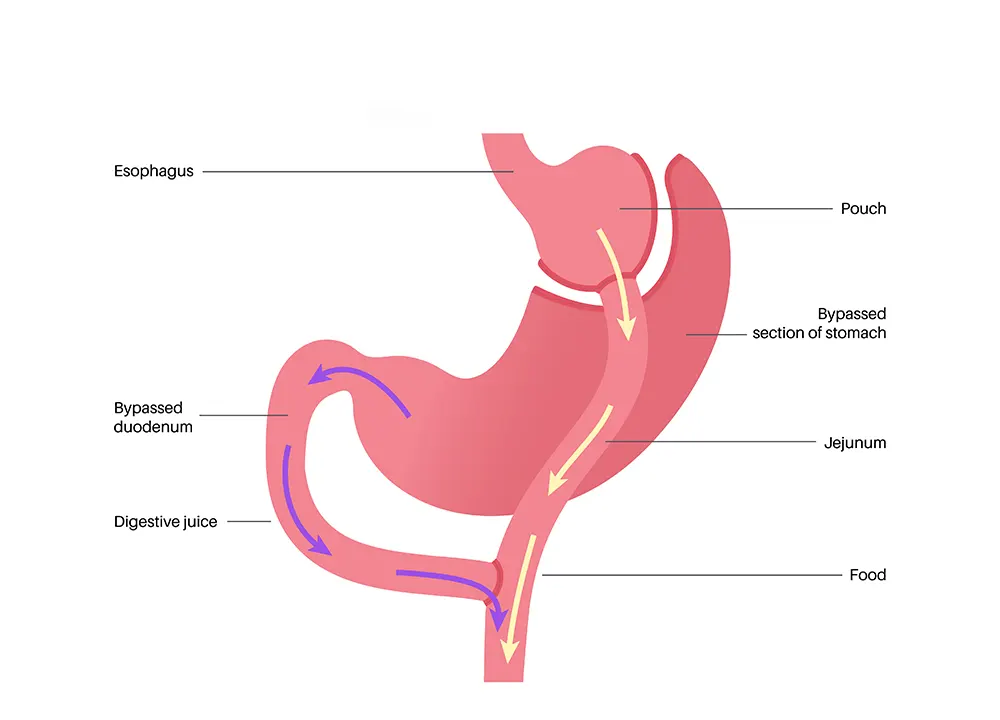- Call Today +90 537 762 59 24
- Open Hour Open 24 Hours

Gastric bypass stands as a formidable surgical intervention, considered the ultimate recourse for individuals who have struggled to achieve significant weight reduction through alternative approaches. This procedure involves the creation of a small pouch at the top of the stomach, which is then connected to the small intestine. This connection restricts food consumption and reduces both caloric and nutrient assimilation.
While gastric bypass can be a potent method for achieving substantial weight loss, it is imperative to recognize that it is a significant surgery with inherent risks and potential complications. Prospective candidates must be aware of possible adverse consequences, such as hemorrhaging, infections, and vitamin deficiencies. It is crucial for individuals considering this alternative to collaborate closely with their healthcare team to determine if gastric bypass is the optimal choice for them and to ensure the most favorable outcome.
Gastric bypass is a surgical intervention specifically designed to aid individuals grappling with obesity in shedding excess weight. The procedure involves the creation of a small pouch at the top of the stomach, which is then connected to the small intestine. This connection limits food intake and reduces caloric and nutrient absorption.
Typically recommended for individuals with a body mass index (BMI) of 40 or greater, or those with a BMI of 35 or higher accompanied by additional obesity-related health issues, gastric bypass can lead to significant weight reduction. However, patients need to comprehend both the risks and benefits before deciding if it is the appropriate option for them.
Gastric bypass is a complex surgical procedure usually performed under general anesthesia. The operation involves separating the upper portion of the stomach from the rest, creating a small pouch using staples. The small intestine is then divided and attached to the small pouch, allowing food to bypass the larger stomach section and the upper segment of the small intestine.
This procedure can be conducted through open surgery or laparoscopy, a minimally invasive approach involving small incisions in the abdomen. Patients should closely collaborate with their healthcare team to prepare for the operation and ensure a successful outcome. Additionally, adhering to a strict diet and exercise regimen post-surgery is essential to support weight loss and maintain overall well-being.
Beyond weight loss, gastric bypass surgery offers various health benefits, including improved type 2 diabetes, hypertension, and sleep apnea. Patients often experience enhanced overall well-being and a higher quality of life after undergoing the procedure.
While gastric bypass is generally safe, like any surgical intervention, it carries potential risks and complications. These may include infections, blood clots, and gastrointestinal issues. However, the likelihood of complications can be minimized with careful preoperative assessment and postoperative care.
Let's take a look at frequently asked questions about Gastric Bypass
Gastric bypass surgery is a bariatric procedure that facilitates weight loss by altering the digestive system's anatomy. It involves creating a smaller stomach pouch and rerouting a section of the small intestine. This results in reduced food intake and decreased nutrient absorption, contributing to effective weight loss.
Gastric bypass is typically recommended for individuals with a body mass index (BMI) of 40 or higher, or those with a BMI of 35 or higher coupled with obesity-related health issues. A thorough evaluation by a healthcare professional is essential to determine candidacy, considering factors such as medical history and lifestyle.
The recovery period varies from person to person, but most individuals can return to regular activities within a few weeks. Full recovery may take several months, during which patients are advised to follow postoperative guidelines and attend regular follow-up appointments.
Absolutely. Gastric bypass surgery is a tool that, when combined with a commitment to a healthy lifestyle, yields optimal results. Patients must adopt a nutritious diet, regular exercise routine, and adhere to recommended behavioral changes to ensure sustained weight loss and overall well-being.
Weight loss outcomes vary, but on average, patients can expect to lose a significant amount of excess weight within the first year post-surgery. Long-term success relies on adherence to lifestyle changes and ongoing support from healthcare professionals.
It's common for individuals who experience rapid and substantial weight loss to have excess skin. Factors such as age, genetics, and the rate of weight loss contribute to the extent of loose skin. Surgical options may be considered to address this concern.
Gastric bypass surgery is generally considered irreversible due to the permanent changes made to the digestive system. However, in rare cases where complications arise, revision surgeries may be performed to address specific issues.
While it is technically possible to undergo gastric bypass surgery a second time, it is not the norm. Revision surgeries are complex and carry additional risks. The decision to pursue a second gastric bypass or switch from gastric sleeve surgery requires careful consideration and consultation with a healthcare professional.
© 2026 Copyright by Private Koru Hospital. All rights reserved.
